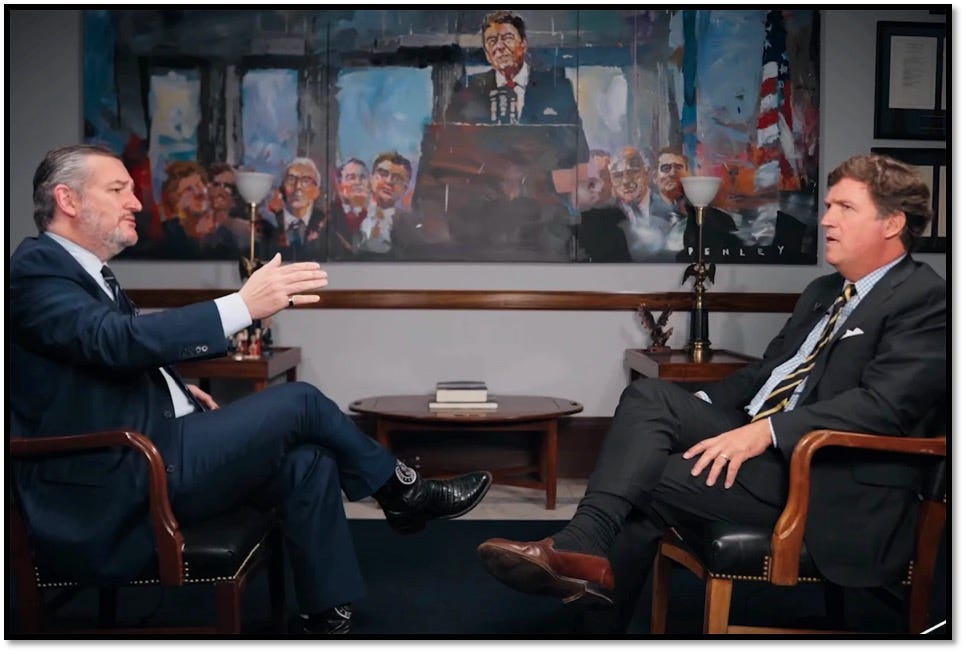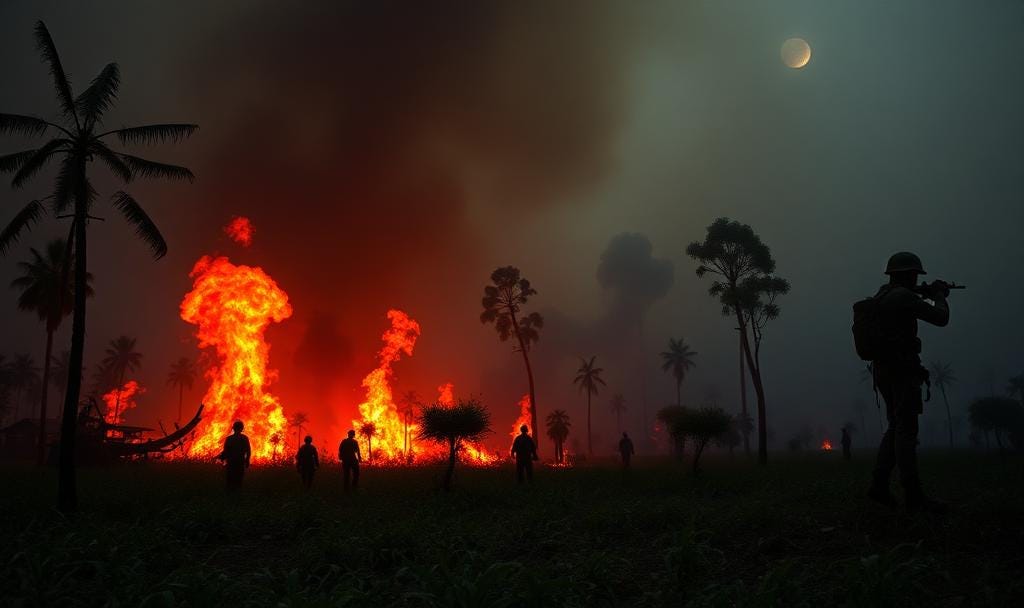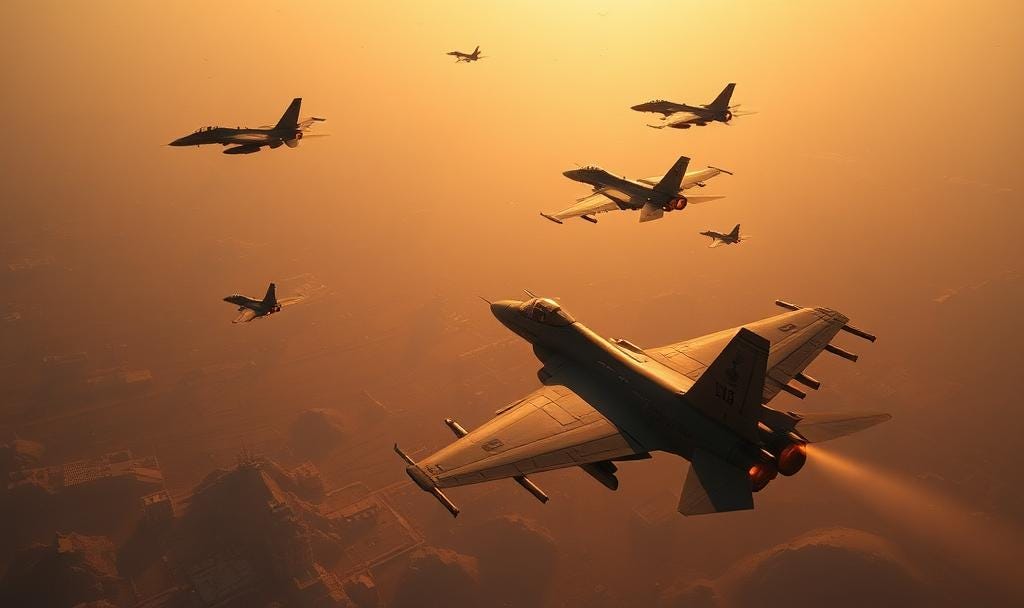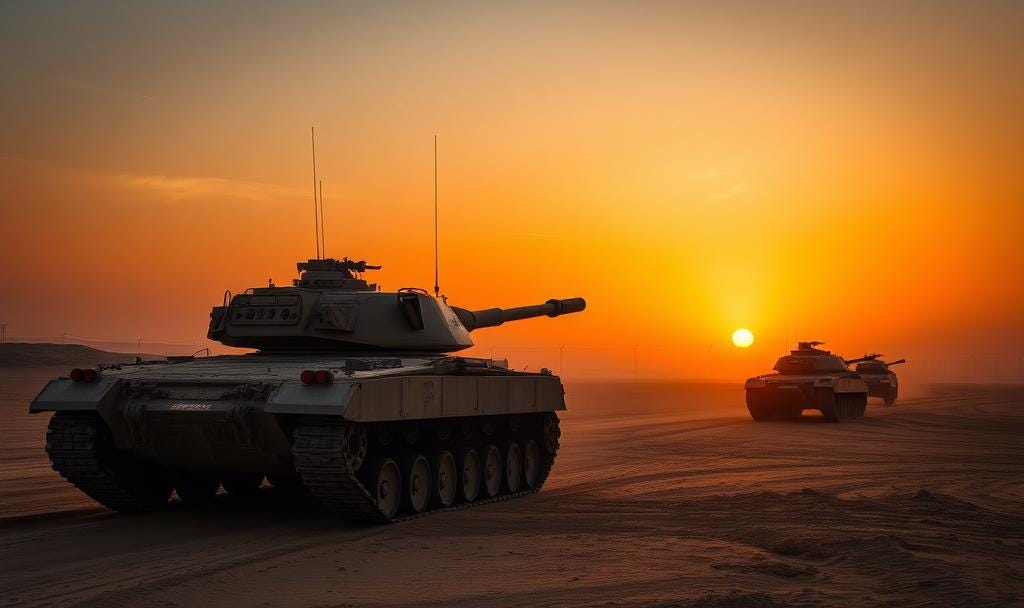Everyone is Missing the Big Reveal in the Cruz-Carlson Interview Fallout
The last 8 decades of military conflict are begging you to read about them, and while Carlson’s intent may have been vindictive, every American should be terrified by Cruz’s responses.
I distinctly remember a visit to the office of Lieutenant Colonel Reinwald in the Fall 2006 semester at Ole Miss. He was one of the senior cadre members at the school’s Army ROTC detachment, which would commission me in May 2008 as a Second Lieutenant. He was a military historian without peer, who loved the subject with great dedication and enthusiasm, all the way down to his collection of painted historical figurines used for terrain maps and displays.
That was the man, I thought, who would help me figure out which service branch within the Army I should be pursuing. I’d already ruled out ranking any combat arms branch at the top, because I would have been an easy target as an Infantry officer; for the same reasons, once you hit 6’6”, you’re not exactly what I’d call a good fit for tanks. I didn’t have the hearing or vision for Aviation. Naturally, the conversation drifted to Military Intelligence, or MI for short. I remember his words well, nearly two decades later:
A good intelligence officer is worth his weight in gold. You serve as the commander’s personal advisor on all matters of intelligence.
Colonel Reinwald thought I would succeed in such a role, so I ranked it first in my branch preference list. After taking the scenic route through a Field Artillery branch detail and medical board for my hearing loss, I eventually made it to the MI Corps. At Fort Huachuca, one of our instructors made it clear to the students that good intelligence officers don’t simply regurgitate the news, which can be found anywhere, but rather put the sizzle on the steak. To be successful, you must produce actionable intelligence out of a fusion of intelligence product (HUMINT, SIGINT, OSINT, etc.) and everyday items that can be found on the front page of a newspaper. Those who are successful tailor it to the recipient and the unit’s direct mission.
If you’ve read Captain K’s Corner for a while, my columns titled The Sizzle are named in honor of this principle. It’s not enough for someone to say “elections are corrupt in Washington.” Everyone knows that. What they may not know is that elections are corrupt in Washington because the state has been engaging in Automatic Voter Registration for nearly a decade, sends mail-in ballots to every entry on the voter roll, and has no restrictions on ballot harvesting, thereby making it as easy as drawing breath for the urban areas to overwhelm everything east of the Cascades, which they vastly outnumber, sir!
That is the difference in information and intelligence.
This brings me to Tuesday night’s interview showdown between Tucker Carlson and Texas Senator Ted Cruz. I realize Carlson has come under criticism from President Trump recently, but it is not Carlson’s opinion in my focus today; rather, it is Cruz’s lack of knowledge and apparent blindness toward American struggles in global conflicts in the not-so-distant past that is on my radar. The conversation was highlighted by Carlson pressing Cruz about what he knew (or did not know) about Iran:
Right-wing media personality Tucker Carlson clashed with Sen. Ted Cruz in an interview and posted a clip Tuesday night in which the senator was unable to answer questions about Iran.
"How many people live in Iran, by the way?" Carlson asked Cruz, R-Texas.
"I don't know the population," Cruz responded.
"At all?" Carlson asked, prompting Cruz to reiterate that he did not know. "You don't know the population of the country you seek to topple?"
Asked again how he did not know Iran's population, the senator responded, "I don't sit around memorizing population tables."
I agree with the significant majority that it is not good for Iran to have nuclear weapons. My opinion is not special, nor is it even slanted against Iran, because I don’t think it is good for world peace that anyone has nuclear weapons. If the proliferation of nuclear weapons was a good thing, then the world wouldn’t cheer the concept of disarmament, and mutual reduction of nuclear stockpiles wouldn’t have been a subject of conversation throughout the Cold War.
Nation states maintain their nuclear arsenals because they don’t trust the other nations to get rid of their own. It’s like two people in a dispute who know a sincere private conversation brings the only hope of resolution, but no one wants to be the first guy to leave his recording device at home because he fears the other may be the only one with a recording. In short, nuclear weapons aren’t good for the world – but they also aren’t going anywhere for the reasons laid out above. One can oppose the deployment of U.S. troops to a Middle Eastern conflict while not wishing for Iran to have nuclear weapons.
A point of dismissal to those engaging in my line of thought regarding Israel and Iran (read it here) has been, “well, what makes you think anyone is talking about putting boots on the ground?”
Sure, if we are to take things at face value, boots on the ground isn’t a popular idea. Here’s how the thought stacks up among my Telegram subscribers, who are arguably the most populist-aligned observers on the Internet worldwide:
Presidential elections in Washington, D.C., are more competitive than my Telegram poll assessing support for boots on the ground in the Middle East. To properly assess second and third order effects of any action, the intelligence officer must consider what will happen when any first action is taken. Anyone experienced in the game of chess knows this to be the truth, as well. What makes me think military action of any sort, including materiel support, will eventually come to an argument to put boots on the ground by the same coalition that brought you the Iraq War? Simple – history never lies.
Remember, it was just advisors in Southeast Asia in the 1950s. They were just working on a little containment, nothing big. The French had it all under control.
It was only surgical strikes in Afghanistan, which of course must happen in response to 9/11. Only conspiracy theorists would suggest children of these soldiers would serve in the same war two decades later.
We just had to see if Iraq had weapons of mass destruction. That’s it, guys. Why would anyone suggest we would rotate troops in and out of there for years on end?
And that brings me right to where we are, and it’s not about whether you think we should engage in the conflict between Israel and Iran. It’s about the lack of precision and preparation that is prevalent among those tasked with directing U.S. policy, made evident by Cruz’s blunder with Carlson.
Cruz is in his third term as a U.S. Senator, and was reelected by a comfortable margin in 2024 thanks only to Trump’s massive progress with the Latino working-class. He would have had to campaign hard without Trump on the ticket and barely held on to his seat in 2018 against an Irishman with a fake Hispanic nickname who campaigned on stripping Texans of their firearms. I would expect someone with so much experience in the federal government, and even a presidential campaign under his belt, to have a baseline level of knowledge about a country that has consistently been placed at or near the top of potential geopolitical adversaries for decades now.
What is the population of Iran, Mr. Cruz?
An answer accurate to the nearest 25 million would probably suffice. I don’t think anyone would have even bothered to waste a comment if Cruz would have said 80 million, or perhaps 100 million. Carlson wasn’t asking for the difference in population between Fort Wayne and Toledo.
Here are some stats, according to the United Nations estimates for 2025:
Iran population: 92,417,681
Iraq population: 47,020,774
Now, for the capital cities (and the largest cities by population) in each, per Worldometer:
Tehran population: 9.6 million
Baghdad population: 7.9 million
The population numbers for Tehran and Baghdad are for the municipalities only, and climb significantly when factoring in the surrounding metropolitan areas. These population figures are extremely important, because Tehran is only 21.5% more populous than Baghdad, while Iran as a whole is nearly exactly double the size of Iraq by population. This means that Iran has substantially larger cities outside of its capital than Iraq does, creating an entirely new set of military challenges.








